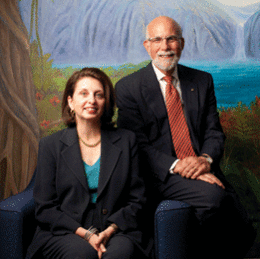
Local organization gives abused children comfort, guidance and hope for the future
Almost immediately upon walking into the Rowan University CARES Institute in Stratford for the first time this past fall, Gina Pincosy felt the tears coming on. “I started bawling,” she admits. But it wasn’t because she was grief-stricken for the children being treated at CARES, which stands for Child Abuse Research Education & Service. It wasn’t because she was thinking back to her own sexual abuse as a youth, either. These were actually tears of joy.
“I remember looking around and seeing all these drawings that the kids there did,” Pincosy says. “There’s a big drawing of a happy face and it says ‘Happy.’ I know that that kid didn’t come in there feeling that way. All these drawings that I saw were just overwhelmingly positive, and I could see the kids playing in one area. I know that it’s that treatment at CARES that helped them to be able to let the negative thoughts about themselves be assigned to someone else.”
Pincosy knows all about those negative thoughts. She had them in Montreal, where her abuse occurred at the hands of an uncle. She carried it with her when her family moved to Cherry Hill when she was 10, and she kept it hidden through her days at Cherry Hill High School East and on to college in Virginia. In fact, she never even told anyone until well into adulthood.
She eventually spoke of her abuse to a therapist, and even went on to write a book about her experiences, titled What If I Tell? Pincosy was invited back to South Jersey to not only tour the CARES Institute, but also to speak at the center’s “Calling All Angels Gala,” an annual fundraising event. “Gina Pincosy was amazing,” says Steve Kantor, who founded the gala in 2008. “Her story is so sad, but at the same time it was so powerful. You could hear a pin drop when she was talking.”
“There was a time when I wouldn’t even admit it to myself, so the thought of ever telling anyone, even my best friend, wasn’t going to happen,” Pincosy says. “I just really have gotten to a very different place, so for me it’s so meaningful to be able to talk about it because it’s the only way to make a difference. You can’t get help through the CARES Institute or anyone else if you don’t disclose what’s going on with you. For me, I never talked about it, so I never got help until 30 years later when I finally did say something to a therapist. I basically went through the exact same evidence-based practices that the CARES Institute uses on children.”
Dr. Martin Finkel, area pediatrician and the founder of the CARES Institute, helped define the field of medical diagnosis and treatment of sexual victimization in children. When he first started studying the topic in the early 1980s, no medical literature existed. He went on to author many scientific papers on the subject and the primary textbook on the medical evaluation of child sexual abuse published by the American Academy of Pediatrics, now in its third edition.
Around that time, he gathered a team of psychologists and social workers to diagnose and treat all forms of child abuse. That team morphed into the Center for Child Support, which eventually became the CARES Institute. “I recognized very early on that the primary impact after everything is said and done is psychological,” Finkel says. “Yes, it’s important to address the medical concerns that children might have about their bodies or injuries or sexually transmitted diseases, but in the long haul, it’s equally important to address the mental health issues.”
That’s why Finkel recruited Dr. Esther Deblinger, a psychologist, to join his team in the early days of the center. Deblinger has become internationally recognized for her treatment methods for victims of child abuse and their families, and she is the co-director of the CARES Institute with Finkel. “One of the things that really appealed to me in terms of joining him in New Jersey was his enthusiasm and interest in working in a multi-disciplinary manner,” Deblinger says. “At CARES, we’re really focused on working collaboratively, not only with one another as medical and mental health professionals, but also with law enforcement and child protection and other professionals in the community that really address the needs of children who have suffered abuse. I think we are very committed to that, and it shows in our success.”
CARES serves the southern third of the state, and whenever there are concerns that a child has suffered physical abuse, sexual abuse or neglect and the Division of Child Protection and Permanency is conducting an investigation, that child is referred to the center for diagnosis and treatment. Not only has Finkel established a safe and comfortable environment for the initial medical evaluation of the child, but the collaborative nature of the organization allows for a seamless transition to the mental health treatment. The CARES professionals also work closely with law enforcement officials, as they have a responsibility to defend their findings, often in court.
But as proud as Finkel and Deblinger are of the work they do for children in the area, it is the research side of CARES that is having a global impact and really making a difference. “While we’re a South Jersey organization and we provide a huge amount of clinical service and professional training to New Jersey, we also have a national and international footprint in terms of the work we do,” Finkel says.
“Dr. Deblinger and I speak all over the world and we have colleagues from all over the world who come here to visit the institute, both in the medical and mental health fields, to receive training and learn how we approach these children, how we set up systems of care. There’s an increasing realization that this is a problem in many, many countries. They used to think that this was just an American problem, which obviously it is not.”
Deblinger’s research led to the evidence-based treatment known as Trauma-Focused Cognitive Behavioral Therapy (TF-CBT). It’s an approach that tackles the issues of abuse head on from the start of treatment. “We begin oftentimes by educating children and their parents about these issues,” Deblinger says, “by helping them develop coping skills to manage the emotions that often develop as a result of abuse in children and their parents, and we encourage the children to write about what they have experienced, including their thoughts and feelings and even their bodily sensations, so they can really face memories that many, many children try to push out of their minds, unsuccessfully.”
TF-CBT was part of the treatment that Pincosy underwent in her mid-30s. After writing her book, she decided to become a therapist herself, and as she was earning her master’s degree in social work, she extensively studied the modality, including videos of therapy sessions conducted by Deblinger. Pincosy met Deblinger for the first time when she toured CARES. “She’s the one who developed that specific treatment protocol, so it was really a great connection,” Pincosy says. “I was super excited, because not only did I go through that, but I use that with my clients because I know how effective it is.”
The only negative of Pincosy’s experience with CARES is that there’s a limit to how many children in the area they can treat because of financial and staffing issues. That’s what Kantor is trying to solve with the Calling All Angels Gala. He found that many people in South Jersey had never even heard of the organization, and it’s been his mission to bring awareness to the problem of child abuse and raise money for CARES. “The first year we did it, we sold out, and we’ve sold out every year since,” Kantor says. “Since our first event in 2008, the whole thing at Penn State happened, so people were talking about this stuff. It goes on and people don’t want to deal with it so they sweep it under the rug. It happens in families; the statistics are really staggering. When you ask the doctors how to change this, their answer is that the only way to change it is to talk about it. So we’ve been incredibly successful at gathering businesses together and getting people behind this thing. We’ve raised well over a half-million dollars and we’ve gotten the story out.”
Much more work needs to be done, including raising the levels of awareness. Finkel stresses that even when child sexual abuse is talked about, it’s often the wrong message. “The newspaper reinforces this unfortunate perception that the people you have to worry about are strangers or Megan’s Law offenders or coaches or priests, which are a tiny, tiny percentage of the perpetrators of sexual victimization,” he says. “Surely what they do is terrible and surely it has a really serious adverse impact on children, but it represents probably less than 1 percent of all the sexual victimization out there. The real risks are in the home, and that’s what we need to be talking about. … About 25 percent of the perpetrators are someone like a father, a stepfather or an uncle. The rest are moms’ boyfriends, cousins, nephews. And one of the most alarming trends we’re seeing is a huge increase in child-on-child sexual victimization, which again, nobody is really talking about.”
“I think it’s important for parents to educate their children, because one of the issues that keeps child abuse spreading is the secrecy associated with it,” Deblinger says. “The more we all speak out about these issues, not only to each other but to our children, the more healing there will be.”
Published (and copyrighted) in South Jersey Magazine, Volume 11, Issue 1 April, 2014).
For more info on South Jersey Magazine, click here.
To subscribe to South Jersey Magazine, click here.
To advertise in South Jersey Magazine, click here.












